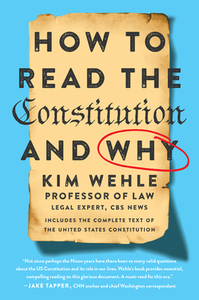Take a photo of a barcode or cover
I'm an undergrad preparing for a law career. From my own research and from what I've learned in my PoliSci classes so far, I knew most of the basic topics, concepts, and ideas in the US Constitution. Nonetheless, this book serves as a great reminder of the importance of understanding what's at stake, how the three branches of government interact with each other, and how subjective and open to interpretation every single article/section is. It summarizes most of the popular SCOTUS decisions (Marbury, Dredd Scott, Brown, Miranda, Plessy, Roe, etc.), explains the issues with originalism vs. "living" constitutionalism, delves into voting rights and democracy, and debunks common misconceptions about the Constitution —that "American values" are explicit in the Constitution, that "strict reading" of the Constitution is a thing, etc—.
The writing is very easy to understand and uses many simple examples. If you already have an advanced understanding of ConLaw, don't waste your time with this book; if you want to deepen your understanding, this book is one of the best options out there to do so :)
The writing is very easy to understand and uses many simple examples. If you already have an advanced understanding of ConLaw, don't waste your time with this book; if you want to deepen your understanding, this book is one of the best options out there to do so :)
This book gave me so many things to consider.
"not... a true democracy...would allow irrational... instead opted for a republic" "people must hold elected representative accountable for violations of the Constitution"
"failure to uphold the Constitution.... just this once, future officeholders will understand that they can get away with violating... in the future"
"they make many, many more laws than Congress does, yet the people who run agencies are not elected"
"what constitutes sufficient injury... inherently subjective"
"Heller...to defend yourself...blew...precedent... in connection with militias"
"in my humble opinion, if the court is to turn precedent on its head, it should probably do so unanimously"
"the government cannot take away all guns...but the government is not constitutionally forbidden from restricting guns either"
"police officers can't do their jobs if they are afraid of well-meaning actions"
"there are many things we all freely do, and which we all take as a given, that are not expressed in the Constitution...whom- to marry without government weigh-in, whether to have children, how to raise those children, and what jobs or careers we choose to have"
"we've had elections in which the losing candidates won the popular vote"
"the term gerrymandering ... Elbridge Gerry... voting district was drawn in a shape that favored Gerry's party and resembled a salamander"
"today people across the nation are calling for another constitutional convention to fundamentally change the text of the Constitution itself. This little-known fact is extraordinary...last time... 1787"
"Constitution...stood the test of 230 years' time"
"not... a true democracy...would allow irrational... instead opted for a republic" "people must hold elected representative accountable for violations of the Constitution"
"failure to uphold the Constitution.... just this once, future officeholders will understand that they can get away with violating... in the future"
"they make many, many more laws than Congress does, yet the people who run agencies are not elected"
"what constitutes sufficient injury... inherently subjective"
"Heller...to defend yourself...blew...precedent... in connection with militias"
"in my humble opinion, if the court is to turn precedent on its head, it should probably do so unanimously"
"the government cannot take away all guns...but the government is not constitutionally forbidden from restricting guns either"
"police officers can't do their jobs if they are afraid of well-meaning actions"
"there are many things we all freely do, and which we all take as a given, that are not expressed in the Constitution...whom- to marry without government weigh-in, whether to have children, how to raise those children, and what jobs or careers we choose to have"
"we've had elections in which the losing candidates won the popular vote"
"the term gerrymandering ... Elbridge Gerry... voting district was drawn in a shape that favored Gerry's party and resembled a salamander"
"today people across the nation are calling for another constitutional convention to fundamentally change the text of the Constitution itself. This little-known fact is extraordinary...last time... 1787"
"Constitution...stood the test of 230 years' time"
This is a pretty good overview of the basics of the Constitution, with discussion of various important Supreme Court cases that have led to the current balance of powers. The author discusses noteworthy arguments which have arisen throughout the years regarding interpretation of various clauses, and explains the impacts of interpreting things one way or another. I feel that the book becomes less scholarly towards the end, and more opinion driven, but overall it's still quite informative.
One thing that stands out to me is how much the various amendments in the Bill of Rights are subject to judicial discretion. It often seems that the Constitution is read as "these rights shall not be infringed... unless the government has a good reason for wanting to do so". What constitutes a good reason is then largely up to the courts to decide, and the result changes pretty drastically over time, depending on the political atmosphere. Pretty much every right has a long list of exceptions, and a lot of effort seems to be spent pushing the line one way or the other.
One thing that stands out to me is how much the various amendments in the Bill of Rights are subject to judicial discretion. It often seems that the Constitution is read as "these rights shall not be infringed... unless the government has a good reason for wanting to do so". What constitutes a good reason is then largely up to the courts to decide, and the result changes pretty drastically over time, depending on the political atmosphere. Pretty much every right has a long list of exceptions, and a lot of effort seems to be spent pushing the line one way or the other.
I found this a little hard to follow but liked her conclusion: our constitution is just a piece of paper until someone (congress) enforces it. Our government hinges on this part of our democratic process working. We need all three branches working together for our country to work. A good refresher on how the constitution reads and why as the title says.
There was a lot of info here. I did feel that the author was one sided politically, as she seemed to target Trump. Maybe because his actions have put the constitution to the test more than others.
All and all a good book.
All and all a good book.
informative
slow-paced
This is an exceptional book. It outlines the Constitution in a modern, digestible manner without partisanship. The reality is that the Constitution is vague and ambiguous - but also incredibly important. It's worth reading to truly understand it's imperfections and its value. This is an educational and thought-provoking book that does so much more work than any middle school or high school textbook I've ever had to read.
informative
medium-paced




